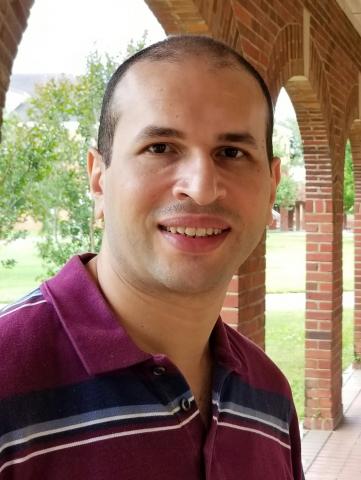Computer Engineering Ph.D. Student Uses Artificial Intelligence to Predict Epileptic Seizures
Dr. Hisham Daoud’s research on efficient seizure prediction could improve the lives of millions of people living with epilepsy.
Daoud will receive a Ph.D. in Computer Engineering at the Graduate School Commencement ceremony on Friday. He received his BSc and MSc in Electronics and Communications Engineering from Cairo University in Egypt and obtained a Ph.D. in the same field from Ain Shams University.
His research interests led him to pursue further studies at UL Lafayette.
“My persistent motivation is to introduce innovative technologies in the biomedical field to improve the quality of life for patients suffering from neurological diseases,” Daoud says. “I wanted to extend my previous research by doing a PhD in computer engineering to have a genuine contribution to this area of research.”
UL Lafayette was a great environment to pursue my PhD where I found a high quality of education and research as well as tremendous support given by the UL community."
His research with Professor Magdy Bayoumi on seizure prediction based on deep learning was recently published in IEEE Transactions on Biomedical Circuits and Systems. Their ground-breaking prediction technique improves the tracking of brain activity prior to the seizure occurrence.
Daoud also received first place for best STEM paper in the Graduate School's 2022 Graduate Research Showcase.
“My research focuses on developing artificial intelligence (AI) algorithms to automate the epilepsy diagnosis and provide high accuracy decisions,” Daoud explains. This promising approach would offer an alternate to the standard method of visual EEG interpretation which, he notes, “is extremely difficult, time-consuming and prone to errors.”
It is difficult for medical professionals to predict seizures because of the wide variation in patients’ brain activity patterns. Electroencephalogram (EEG) tests traditionally undergo predictive modeling, a process that relies on statistics.
Daoud and Bayoumi have developed an artificial intelligence system that uses EEG data and predictive modeling simultaneously to efficiently detect seizure onset.
Currently, while 70% of patients respond to anti-epileptic drugs, the other 30% are considered uncontrollable. Developing an accurate way to provide advanced notice of seizures is key to improving treatment and disease management strategies for epileptic patients.
“In order to improve the quality of life for epileptic patients, we are working on using AI to accurately predict the incoming seizures ahead of time to allow the patient to take a proper action, which might be life-saving if the patient is driving or walking,” Daoud notes.
Their research has shown promising results in predicting seizures up to one hour before they occur.
Patients who do not respond to medication or other treatments may turn to focal resection, which surgically removes the part of the brain responsible for seizures. Daoud hopes his work developing machine learning algorithms may also be able to improve outcomes for this treatment option.
Learn more about our graduate programs in Computer Engineering.
